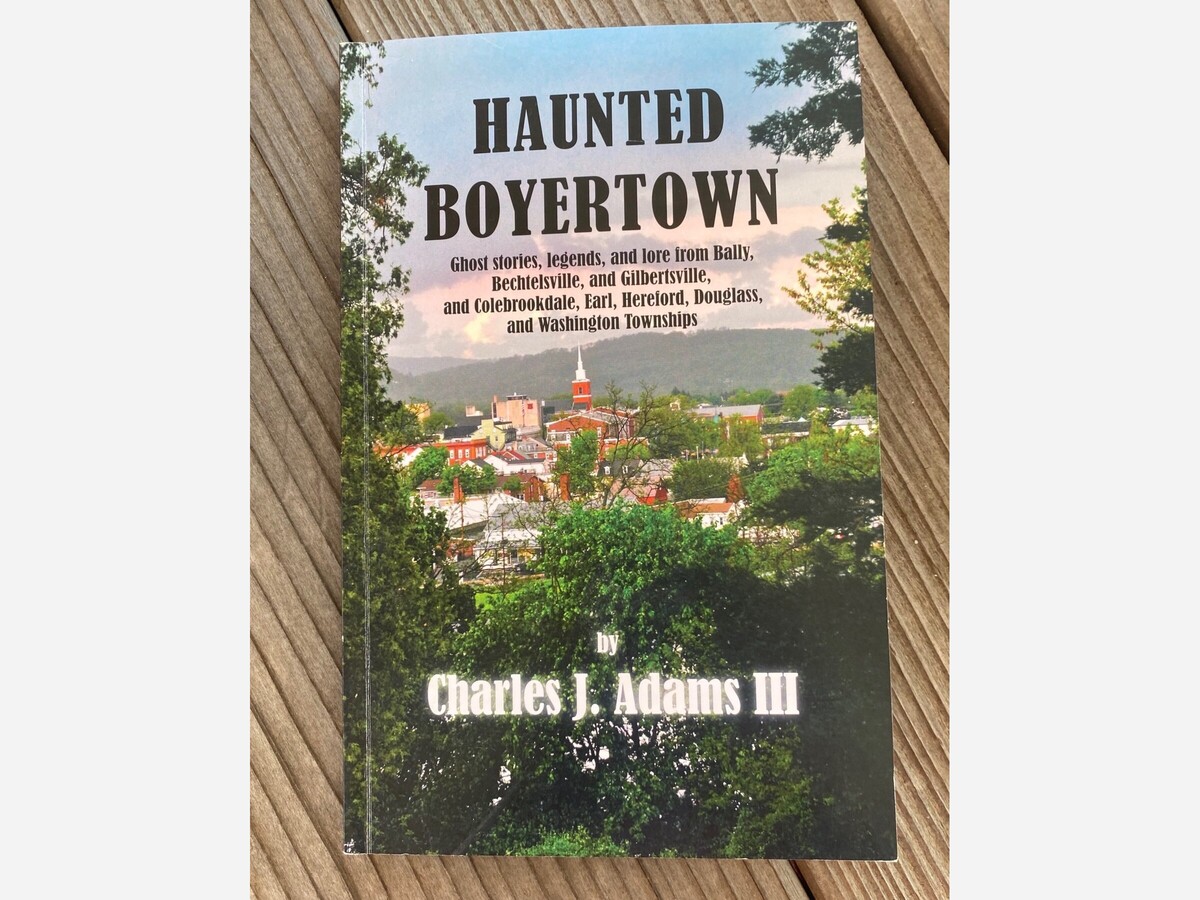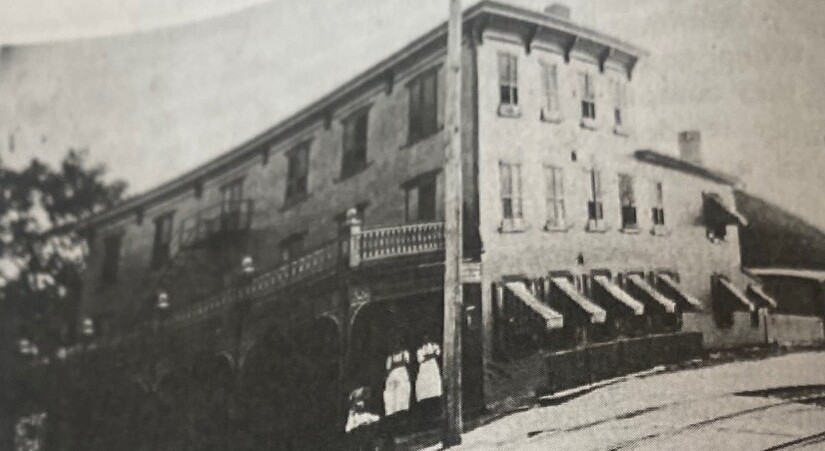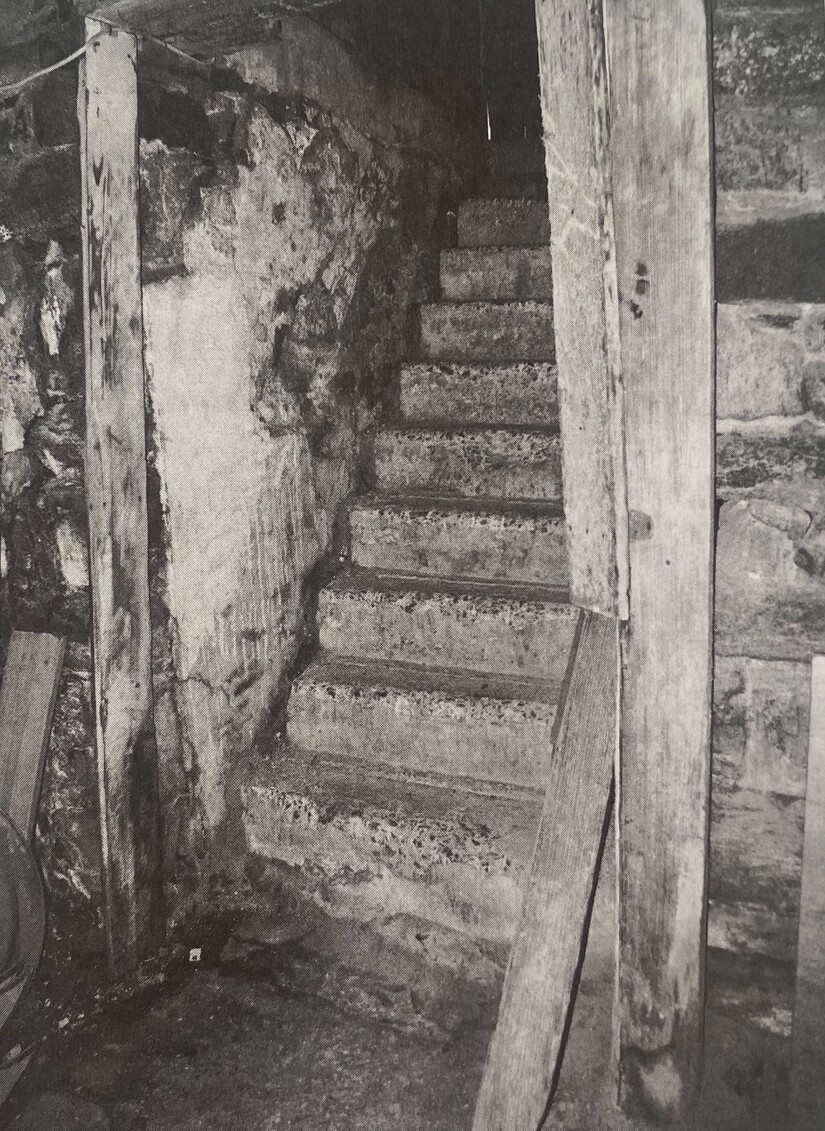Image


by Charles J. Adams, III
The Dark Side of Durango’s 120 E Philadelphia Avenue
The permeating paranormal pedigree of the Opera House Fire notwithstanding, another building n Boyertown claims an inordinately high level of unexplained activity.
It is Durango’s Saloon, 120 E Philadelphia Avenue.
If there was any place that could honestly advertise, “Dine with the spirits,” it is Durango’s.
Built as a private residence by William Shaner in 1859, the building was converted into a hotel by Charles Fegley in 1870. He called it the William Penn Hotel. When Samuel Sperry purchased it in 1884, he renamed it the Mansion House.
Pete Haberle, the owner of the popular bar and restaurant at the time of this writing, is convinced that ghosts roam the rooms of the building.
In 2004, Pete left his job at an industrial facility in his native Pottstown and, with his wife Sandy, purchased Durango’s. The inherited the eclectic collection of antiques and oddities that still fill the walls and shelves of the restaurant. They also retained the name, which is said to be derived from a previous owner’s visit to, and infatuation with, the town of Durango, Colorado.
The haunting of Durango’s is on many sensory levels.
Pete said the first hints of a haunting were the many photographs (film, not digital) that were taken by patrons and staff in the first year of his ownership. Cloudy forms, wispy figures, and other anomalies were clearly obvious. Curious, Pete set up an elaborate test that would help dismiss the foggy blurs in the photographs as cigarette or candle smoke. He was convinced that the pictures were not contrived.
The restaurant and bar are set in a building that has undergone many structural changes over its existence. With every addition made, wall removed, door sealed, and renovation, the flows of the fields of energy inside the structure may have been diminished, intensified or altered in some way.
In my nearly 40 years of investigating haunted places, I have come to believe that architectural modifications could contribute to the paranormal activity.
Much of the unexplained activity at Durango’s has taken place in the dark and dank recesses of the basement.
Sealed by solid stone and concrete walls, that basement serves many purposes for the restaurant and bar operation. As I wandered its warren of chambers and passageways, I noticed steps that go nowhere, doors that have been nailed shut for decades, and the remnants of a tunnel that led from the Mansion House to a building on the other side of the railroad tracks.
Waitresses retrieving supplies from the basement have reported phantom fingers brushing their hair and waving away nonexistent cobwebs.
“I’ve had my ear flicked down there,” Pete said with a nervous laugh. I was in the basement alone and felt a very distinct ‘snap’ on my ear.”
The massive, heavy door of the walk-in cooler has closed on its own, sometimes momentarily trapping staffers inside. Pete demonstrated how that door could absolutely not swing shut without considerable force.
Pete Haberle’s most convincing encounter with the unknown occurred near closing time when he was in the barroom half of the building.
As he toiled at his tasks, his eyes caught a vision in the kitchen. Through the opening in back of the bar, he saw someone—something—standing inside the kitchen. He knew without doubt that he and Sandy were the only ones in the building at the time.
Or, were they?
I saw it, and then my wife saw it,” he said. He described it as a black figure, a torso that glided through the kitchen. “We only caught a little glimpse of it,” he explained, but we know what we saw.
These are anecdotal stories, but they are complemented by a baseline of tragedy and evidence collected by numerous paranormal investigators, including Scott Wiley, the founder of a team called Northampton County Paranormal.
Since his mid-teens, Wiley has been seeking ghostly activity. He takes his pursuits seriously and is more than willing to share his findings with a curious public.
Wiley uses a quasi-scientific approach that employs electromagnetic field detectors, digital recorders, top-flight cameras, and other investigative equipment.
His work at Durango’s has yielded several bits of evidence that have convinced him that Durango’s is haunted.
Investigations employing detection devices have revealed anomalies that suggest wide swings in temperatures and significant concentrations of electromagnetic energies.
Bits of video and audio evidence have also been collected at Durango’s, adding to the mysteries of the old hotel building.
Electronic gadgets can provide only a portion of the total package of a true paranormal investigation, and their readings can be terribly flawed. When combined with the products of human sensitivities, however, they complement one another,.
Former residents of the building’s five apartments have been interviewed, and some have testified that they have seen and/or sensed forms and figures, heard disembodied footsteps and voices, and felt gentle pressures of “something" siding up to them.
Pete had the opportunity to speak with former owners of the building who confirmed that at least three people died of natural causes in the building. There are also wild rumors of more nefarious deaths there, but are unsubstantiated.
Many apocryphal tales about the circa 1847 hotel building are told. One, that it was used as a temporary morgue in the aftermath of the Opera House fire, has been disproved. Others, including grisly suicides and murders in the building are unsubstantiated.
Contemporary reports in 1908 confirmed that the building did suffer damage during the Opera House Fire. The New York Times reports, “The Mansion House and other buildings close to the Opera House caught fire and the conflagration threatened to wipe out the business portion of the town, It was controlled with outside persistence."
Also, 61-year-old Henry Binder, a former proprietor of the Mansion House and prominent Boyertown politician, died in the Opera House Fire.
Therefore, the grief-stricken families and exhausted firefighters and volunteer cleanup crews would have expended extraordinary emotional energies as they met there to sort out the details of the disaster. There are photographs that depict large crowds being held back on the pavement in front of the Mansion House as they stared blankly at the fire scene. Vestiges of that potent energy may still inhabit the interior of the building.


The building that now houses Durango’s Saloon, pictured when Rufus Kepler operated it as the Mansion House (top) and presently (below).

An ancient stairway in the basement of Durango’s Saloon.
What is known is that phantom footfalls have been heard in upstairs apartments and almost anyone who has ever worked at Durango’s has a tale to tell about untoward experiences.
Researchers have also retrieved EVP (Electronic Voice Phenomena) snippets inside Durango’s, but most of those recordings have been inconclusive and innocuous.
But the body of evidence gathered there has led both psychical and electronic-based probers—and this writer—to believe the building is quite haunted.
“He’s Staring at Me!” Beck’s Sea Cove Inn, 1063 Route 100 Bechtelsville
The Washington Inn served many masters and functions for the decades it has been a busy stop along Route 100. The old hotel is now Beck’s Sea Cove Inn, a comfortable and commodious seafood restaurant. And, some who work or have dined there, believe some of those who came to call at the old hotel are still around.
It is known that one individual did pass away of natural causes in a back dining room, and several patrons—unaware of that fact—have reported full-body apparitions in or near the affected section of the dining area.
The most telling tale came from a young girl who was dining with her parents. They had no way of knowing that they were in the corner of the restaurant where the confirmed death took place.
The family had just begun to eat when their wide-eyed daughter urged them to leave. “He’s staring at me,” she pleaded, repeatedly, “He’s staring at me.”
All she could tell her mom and dad is that a mysterious man who appeared, stared down at her, and vanished back into the void
The parents were so convinced that their distraught daughter had been approached by a ghost that they asked for their meals to be packed for takeout!
The Incredible Story of the Naked Witch of Greshville: Woman driven to insanity by witchcraft charges.
There are a few tales of “Witchcraft Hysteria” in the dark annuls of Berks County’s history.
But an incident in the summer of 1891 made national news when a stout 30-year-old woman was allegedly driven to insanity by the belief of neighbors that she was indeed a witch.
Mary Ruth was described as a “stout” medium-sized, 160-pound woman who lived with her 45-year-old spinster sister named Hannah and their younger brother. Together, they cared for their invalid mother who died in the springtime of 1891. Their home was a one-story stone house surrounded by a forest on a hill just west of Greshville.
The strange and convoluted story unfolded several years before when a woman who lived near the Ruths contracted a mysterious ailment.
Her husband, Horace Boyer, claimed that his wife “got queer spells generally once a day, when she would become violent, tear her hair out, and try to jump out of a second-story window.”
Frustrated and fearful, Boyer consulted a nearby healer who told him that his wife was under a spell—“having become bewitched or magnetized.”
The healer prescribed “charms” that Boyer could use to treat his wife’s maladies.
In short order, Boyer’s wife began to feel better. Within days, she was able to perform her household chores with no evidence of any illness—mental or physical.
Because the “healer” provided “charms” that were applied and led to her recovery, neighbors were convinced that Mrs. Boyer’s problems had been caused by a curse that was put upon her.
And, they pointed an accusatory finger at Mary Ruth.
Word spread quickly in sparsely populated area around Greshville: Mary Ruth was a witch.
Mary heard the rumors. She immediately visited Otto Nagerman in Reading, who was known far and wide as a “witch doctor.”
That is, he treated those who were accused of being a witch. He was one of about a dozen such “doctors" in Reading at the time.
In Volume 10 of the Medical Standard of 1891, the practice of the “doctor” was described. “When hysterical females and male sexual hypochondriacs fail to respond to medication, he is consulted and his decision sometimes leads to local persecution of the suspected witch.”
Such was the case after Mary Ruth visited Nagerman.”
She told a reporter, “I asked him whether it was true that I had put a spell on her (Mrs. Boyer). He said that she had certainly been bewitched, but refused to say whether I was the guilty party. He gave me some medicine and after that I immediately commenced to lose my senses.
“Someone told me that the penalty was a $1,000 fine for witchcraft and that we (she and sister Hannah) would be sued and all our property taken from us.
“This worried me and I’ve had no rest and peace of mind since.”
Mary also acknowledged that she had earlier purchased a “dream book” out of idle curiosity and for amusement experimented with some of the potions and procedures. She admitted that she addressed incantations to the moon, boiled herbs in cauldrons, and chanted.
Neighbors had undoubtedly witnessed some of these odd behaviors, and could not help but believe that she was under evil influences.
“Dr.” Nagerman’s assessment didn’t help.
Stuck in a lose-lose situation, Mary deteriorated quickly.
The neighbors were resolute in their belief that Mary was “touched” and relentless in their pursuit of her.
A contemporary report described the incredible story.
“They preyed on Miss Ruth’s mind and she suffered untold tortures. Then, as she seemed to realize the enormity of the accusation, she became a raving maniac.”
She couldn’t sleep. She couldn’t eat. For weeks, she did nothing but pace back and forth in her room.
“She threw furniture out of the window, tore her clothing into shreds, and attacked her sister with a butcher knife and a chair,” one story recounted.
One day, the delirious woman ran out of her house, took off all her clothes, and fled naked through Greshville ahead of pursuers who couldn’t keep up with her.
She disappeared into nearby woods, where she spent several nights until a posse caught up with her and returned her to her home.
Hannah Ruth confirmed the story. “One day while I lay down on a settee to rest,” she said, “Mary disappeared. When I arose, I found her clothes lying on the floor in the corner, and upon looking out the window I saw her going down the road without ant clothes.
“Oh, I felt so sorry. I did no know what to do. I was completely dazed because I was so scared.:
The obviously unstable Miss Ruth made another display of herself when she surreptitiously climbed out of a window of her house, crept down the grape arbor, and wandered all the way to Churchville (now Bally) and the Church of the Blessed Sacrament.
There, she stood before the priest and congregation, and again stripped naked. But she pleaded ignorance of the episode.
“I must have lost my senses,” Mary later told a newspaper reporter. “They say that I disrobed while in church. I was brought back by a man whom the priest told to drive me home in a carriage. I feel very much ashamed, but I didn’t know what I was doing.
Shortly after she returned home, and in a rare moment of lucidity, she decided to visit the Boyer home and confront the woman she was accused of “bewitching.”
Sometime between 2 and 3 a.m., with a prayer book in hand, she knocked on the Boyers’ front door. She spoke with Horace Boyer at length, but nothing is known about their discussion.
But, the day after they met, Ruth admitted to Mr. Boyer, in front of witnesses, that she could have been responsible for his wife’s problems.
With that, Mrs. Boyer made a complete recovery. Horace Boyer told a reporter, “She is now able to do all the housework, bake, and wash. She walked to Boyertown and back last week, which she was not able to do the past six years. She is apparently entirely restored to health.”
Furthermore, Mr. Boyer said he had nothing against Mary, swore he had no role in spreading the rumors of witchcraft, and sympathized with her.
Mary Ruth, however, contined a downward spiral.
The day after Mary met with the Boyers, she once again strolled out of her front door, totally nude.
She was shortly taken into custody and local authorities and committed to the state insane asylum in Harrisburg, where she lived for the rest of her days.
More Books by Charles J. Adams, III
Haunted Jim Thorpe
Eastern Pennsylvania Ghost Files: Updated
Tales from Baseballtown
Ghost Stories of Delaware County
Coal Country Ghosts, Legends, and Lore
Atlantic County Ghost Stories
Ghost Stories of Chester County
Montgomery County Ghost Stories
Philadelphia Ghost Stories
New York City Ghost Stories
Cape May Ghost Stories, Book I
Cape May Ghost Stories, Book II
Cape May Ghost Stories, Book III
Shipwrecks & Legends ‘round Cape May
Pocono Ghosts, Legends & Lore, Book I
Pocono Ghosts, Legends & Lore, Book II
Ghost Stories of Pittsburgh & Allegheny County
Pennsylvania Dutch Country Ghosts
Ghost Stories of the Lehigh Valley, Book I
Ghost Stories of the Lehigh Valley, Book II
Berks the Bizarre
Haunted Berks County
Legends of Long Beach Island
Shipwrecks Off Ocean City (NJ)
Great Train Wrecks of Eastern Pennsylvania
Luzerne & Lackawanna Counties Ghosts
All books may be ordered online at www.bn.com (Barnes and Noble) For more information, go to www.exeterhousebooks.com and click on the ONLINE CATALOG. Also check the website for information about upcoming ghost tours, talks, book signings, and special events. EXETER HOUSE BOOKS, Box 6411, Wyomissing, PA 19610, www.exeterhousebooks.com.